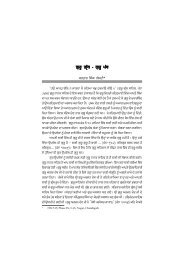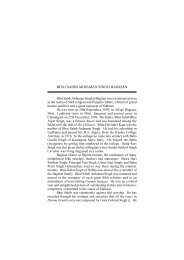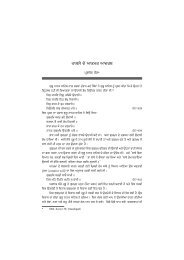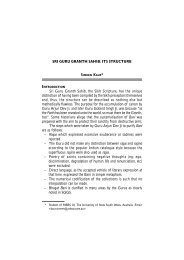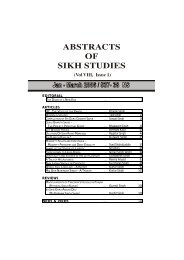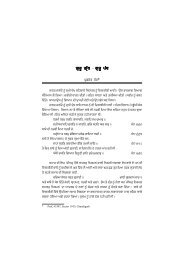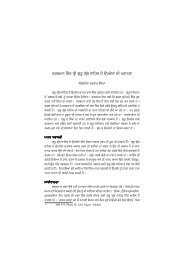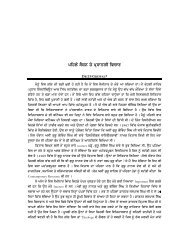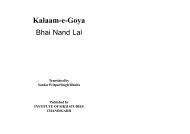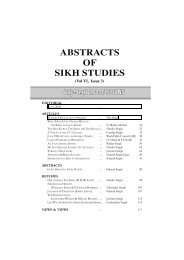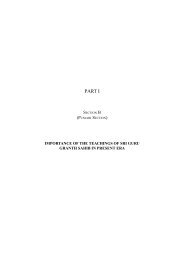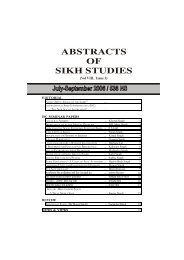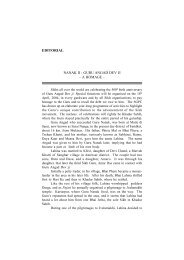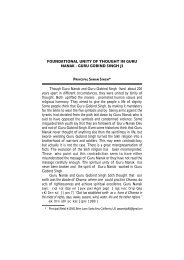editorial articles reviews news & views - Institute of Sikh Studies
editorial articles reviews news & views - Institute of Sikh Studies
editorial articles reviews news & views - Institute of Sikh Studies
Create successful ePaper yourself
Turn your PDF publications into a flip-book with our unique Google optimized e-Paper software.
SIKHS CONTRIBUTION IN NATIONAL INTEGRATION AND COMMUNAL HARMONY<br />
49<br />
ideology <strong>of</strong> the majority is creating problems for the minorities, putting<br />
a dark spot on our nation. To feel inter-related or integrated is a<br />
psychological reality. It has to be cultivated.<br />
We boast <strong>of</strong> a civilization which is 5000 years old. Some <strong>of</strong> the<br />
divisive factors may be inherent in the history, geography and culture<br />
<strong>of</strong> our country, but there are forces, which accentuate these causes:<br />
a) Religious fundamentalism;<br />
b) Linguistic Parochialism;<br />
c) Regionalism, exacerbated by unequal development in different<br />
regions <strong>of</strong> the country, Bihar / Punjab and Haryana;<br />
d) Old caste system, e.g., Dalits / Khatris, Jats / non-Jats.<br />
The euphoria <strong>of</strong> independence was short-lived, as the partition<br />
<strong>of</strong> the country brought in its wake senseless killings <strong>of</strong> Hindus, <strong>Sikh</strong>s,<br />
Muslims across the newly created borders. As a school-going child, I<br />
was a sufferer and witness to stabbing and firing when we migrated<br />
from Pakistan to India. Our train was halted at Mughal Sarai near<br />
Lahore for three hours with a constant threat <strong>of</strong> being butchered. A<br />
godly hand saved us. On reaching Amritsar we learnt that <strong>Sikh</strong>s and<br />
Hindus had stopped two trains full <strong>of</strong> Muslims for a similar fate.<br />
However, sanity prevailed on both sides. There were residual issues<br />
like demarcation <strong>of</strong> boundaries, equitable sharing <strong>of</strong> water resources,<br />
and control over Kashmir. The last problem lingers on as an<br />
international issue even after 57 turbulent years. Five hundred and<br />
sixty two (562) independent princely states were given the option to<br />
join Pakistan or India. Hyderabad (population about 14 million) and<br />
Junagarh (population 5,45,000) had to be annexed with India after<br />
‘police action’ and promise <strong>of</strong> privileges to the rulers. Hindu Maharaja<br />
Hari Singh <strong>of</strong> predominantly Muslim Jammu and Kashmir state<br />
remained uncommitted till armed tribesmen and regular troops from<br />
Pakistan infiltrated his domain inducing him to sign the Instrument <strong>of</strong><br />
Accession to India on Oct 27, 1947. Pakistan refused to accept its<br />
legality and fought wars in 1965, 1971 and 1999. Till today it is a<br />
source <strong>of</strong> friction.<br />
SIKHS' ROLE IN NATIONAL INTEGRATION<br />
Indian society was caste-ridden. The four water tight castes <strong>of</strong><br />
Brahmin, Khatri, Vaish and Shudra were Manu’s gift to the society



